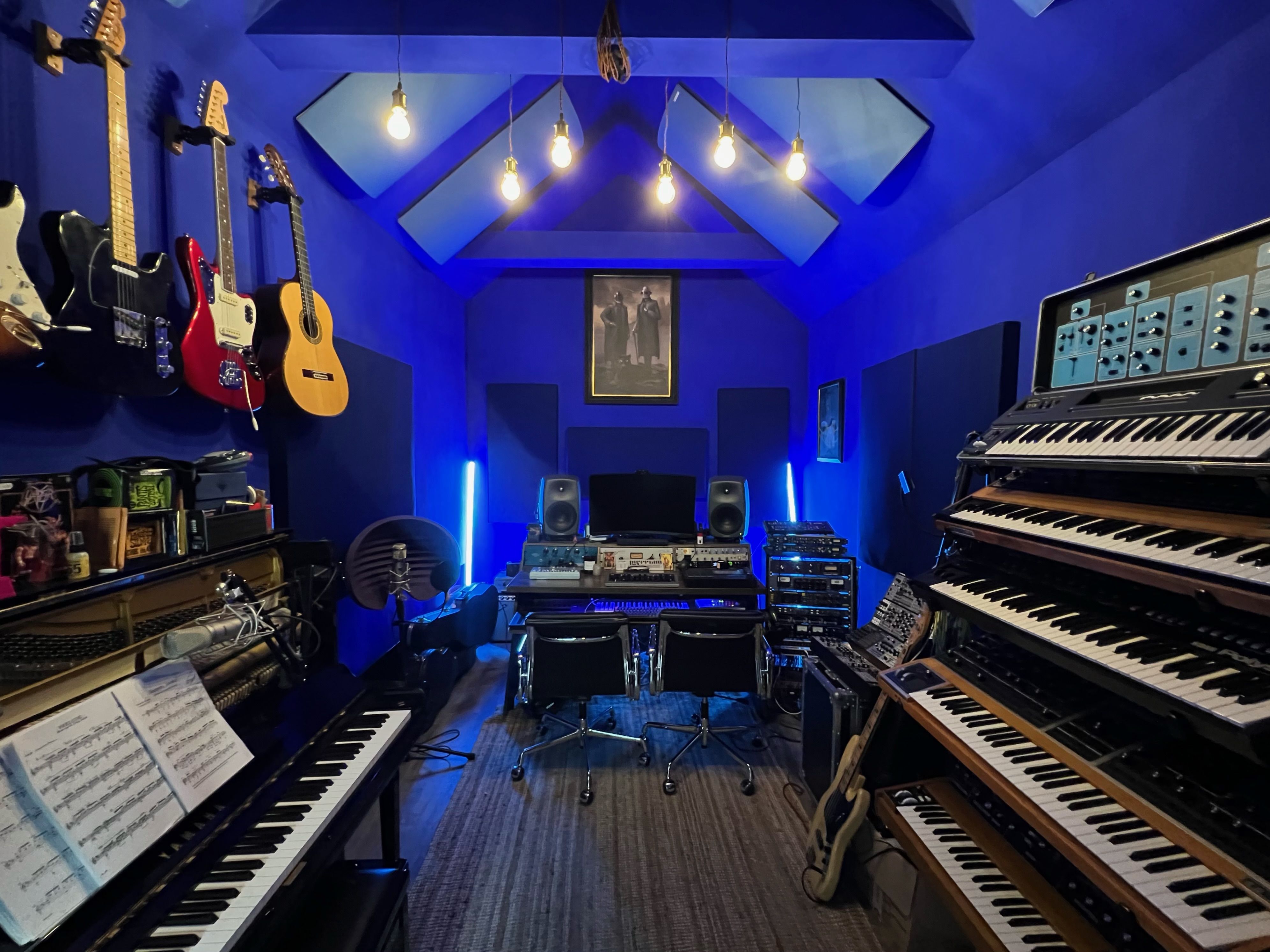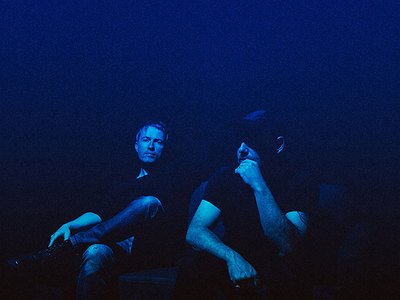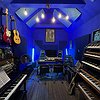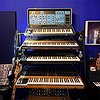Part 1
Name: Iain Cook
Nationality: Scottish
Occupation: Multi-instrumentalist, composer, songwriter, record producer
Current release: Iain Cook teams up with Scott Paterson for their duo project Protection. Their latest single "THX" is out now via Saint Lucky. A full EP, Seeds II, will follow on September 1st 2023. In February, his band CHVRCHES also published their new single “Over” on EMI.
Recommendations: I am currently reading Interviews with Francis Bacon by David Sylvester. It’s a very interesting deep dive into his process as a painter and what drives him to create. Even though it’s not my chosen medium I find his musings about the physical nature of paint and his attitudes to abstraction to be very inspiring.
Also if you haven’t heard it, I would suggest listening to Victorialand by Cocteau Twins. This is a great example of music without discernible words evoking very a strong emotional response. For most of their early recordings, Elizabeth Fraser tended to make up her own language but you always know what she is trying to say. This album is almost completely lacking in drums of any kind which freed up Robin Guthrie to focus on textural arrangements and the result is stunning and timeless.
If you enjoyed this Iain Cook interview and would like to stay up to date with his music, visit Protection on Instagram, and Soundcloud. For more information on CHVRCHES, head over to their website.
For the thoughts of his Protection partner, we recommend our Scott Paterson interview.
When I listen to music, I see shapes, objects and colours. What happens in your body when you're listening? Do you listen with your eyes open or closed?
I find it more difficult to properly inhabit the music with my eyes open. Visual stimulus tends to take me out of the spatial dimensions of close listening. Headphones and eyes closed works best for me.
As a musician listening to music I often find myself trying to pick apart how the music was put together instead of allowing myself to truly immerse on a pure level. It’s much easier for me to deeply enjoy music that I know well because of that I think.
I do find that weed helps a lot with suspending the ‘professional’ parts of my brain that kick in when listening to something new to me.
What were your very first steps in music like and how would you rate the gains made through experience - can one train/learn being an artist?
My first steps in making music were typically in my teenage bedroom, fashioning a multitrack setup with a tape recorder and my home stereo, recording, then playing back the recording through the speakers and live overdubbing back to the tape recorder. Very crude results of course but it was such a buzz being able to layer sounds in any way at all!
I have a fond memory of overdriving guitars without pedals by cranking my amp and burying it face down in a beanbag so as not to annoy my family. After that I got a 4-track recorder which changed everything.
Creatively I do still struggle with knowing ‘too much’. Suspending my technical knowledge and experience of how music should be written to allow something more free and instinctive to come to the fore is a constant battle. But I know that it’s the only way to get something good on tape.
The experience that kicks in after the initial ideas have been captured is invaluable however. Knowing how to edit and distil the raw materials all the way through to prepping final mixes and sometimes mastering is something that benefits me greatly.
Getting into a mental state that allows my creative subconscious to be free enough to receive something unique and unfiltered without me and my experience getting in the way is the hardest part.
According to scientific studies, we make our deepest and most incisive musical experiences between the ages of 13-16. What did music mean to you at that age and what’s changed since then?
That rings true to me for sure. That was around when I dispensed with my classical music training on piano and double bass and started teaching myself guitar with Jimi Hendrix and Jimmy Page as my primary teachers. Pink Floyd / Syd Barrett, Genesis, Tom Waits, Joni Mitchell were hugely influential in shaping my musical language around then too and then I moved more towards metal.
I discovered the Pixies around age 16 which turned everything upside down and my tastes started to skew a lot more left of field from there.
What, would you say, are the key ideas behind your approach to music and what motivates you to create?
What motivates me to create is in a word - connection. I’ve never really been interesting in making obscure music in a vacuum. However brilliant or unique that music could be, it would never really mean anything to me if it didn’t connect with other people.
I think the best music has powerful healing properties - I know this to be true from my own life as a music listener - and it means the world to me when a stranger tells me how music that I have been involved with has helped them through a bad break up, and addiction or whatever.
Not that I need it to be selling out stadiums or topping the charts or anything to be worthwhile, but if no one really cares then I quickly lose interest.
To quote a question by the great Bruce Duffie: When you come up with a musical idea, have you created the idea or have you discovered the idea?
I’ve been thinking a lot about this recently. I would have to say that the best musical ideas come from outwith the artist. There’s a state that you can get to as an artist where you are almost like an open channel to whatever comes along in any given moment.
This I believe is the best possible starting point, where your ego, experience, expertise, mood, ambition, etc. are quietened enough to allow an idea to present itself. I guess this is why you often hear artists talk about taking drugs or drinking to create because these things allow for altered states where all the aforementioned barriers are less intrusive and ideas can flow through more freely.
This isn’t to say that this state is unreachable without altering the brain chemistry. Transcendental Meditation too helps with achieving this state, which is something that Scott and I really bonded over - inspired by the writing of David Lynch on the subject. It’s an invaluable tool not just for creativity and I would recommend any artist spending some time learning the technique.
Paul Simon said “the way that I listen to my own records is not for the chords or the lyrics - my first impression is of the overall sound.” What's your own take on that and how would you define your personal sound?
I hear my music that way too, the size of the space that the music occupies, things in the foreground, background, stereo field, dynamics and the mood that these things create alongside the colour of the harmonic content.
But thinking about it now, there’s something quite architectural or sculptural about the way certain music is constructed and your earlier comment about seeing sound elements as objects supports that. These things are probably at the forefront of my mind when I experience the music I have been involved with.
Interestingly, I watched The Graduate properly for the first time last night which is (over) saturated with Simon and Garfunkel songs. Weirdly the first one in the film sounded like it had been sped up - the chipmunk remix! I absolutely adore the sound of those records. The reverbs they used are so spacious and evocative.
Particularly the sound of the choir in “The Only Living Boy In New York”. That never fails to give me goosebumps and make me well up a bit.
Sound, song, and rhythm are all around us, from animal noises to the waves of the ocean. What, if any, are some of the most moving experiences you've had with these non-human-made sounds? In how far would you describe them as “musical”?
If I am in a particular state of mind I can allow myself to tune into these things in sort of a Cage-ian way but I’m not sure I am blessed with the gift of really hearing those things in a musical way.
Birdsong, waves, wind, etc. can be soothing to me but I am not sure I could really commit to calling them musical. I feel like I could teach myself to hear the world in a different way like this but it’s not a natural way of thinking for me.
From very deep/high/loud/quiet sounds to very long/short/simple/complex compositions - are there extremes in music you feel drawn to and what response do they elicit?
I love long form pieces that I can truly sink into and lose myself in. I travel a lot as I have been almost constantly on tour with Chvrches for the last 11 years and I find that in travel I can quite easily reach a numb, painless state of almost bliss on aeroplanes, trains, vans etc. with the right musical soundtrack. I’m so grateful of noise cancelling headphones!
That said I am also a big fan of very concise songwriting with no fat on it. Saying what you need to say and then stopping. With instrumental music however I think it mostly demands longer form compositions to be effective.







